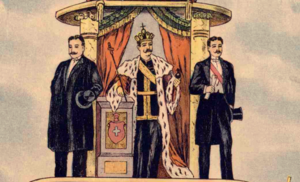More languages
More actions

The nobility, also known as the aristocracy, is the ruling class in feudal and semi-feudal societies. Under feudalism, nobles were hereditary landowners who came from dynasties that passed down their titles from generation to generation.[1]
While the bourgeoisie derives its power from the ownership of capital, the nobility derives its power from the inheritance of status. Nobles do not merely inherit something that gives them privilege (e.g. money): rather, nobles inherit privilege itself, directly. The system of inheritance formed in the early years of urban civilization, when ancient warlords allowed for their children to succeed them and inherit the land and wealth they took by force. From this system of inheritance emerged monarchy and the nobility.[2] In Western Europe, the nobility was, more specifically, the secular landowning class (as opposed to the clergy which also owned land).
With the emergence of capitalism and the bourgeois revolutions against monarchy and feudalism, the nobility lost its power as a class. Depending on how radical a country's bourgeois revolution was, the nobility was either wholly abolished as a class, or was gradually merged into the bourgeoisie with nobles functionally becoming bourgeois landlords.[1]
References[edit | edit source]
- ↑ 1.0 1.1 Great Soviet Encyclopedia (3rd ed.), vol. 7: 'Nobility' (1972) (Russian: Boljšaja sovjetskaja enciklopjedija). [PDF] Moscow.
- ↑ “The wars of plunder increase the power of the supreme military leader and the subordinate commanders; the customary election of their successors from the same families is gradually transformed, especially after the introduction of father-right, into a right of hereditary succession, first tolerated, then claimed, finally usurped; the foundation of the hereditary monarchy and the hereditary nobility is laid.”
Friedrich Engels (1884). The origin of the family, private property and the state: 'IX. Barbarism and Civilization'. [MIA]
